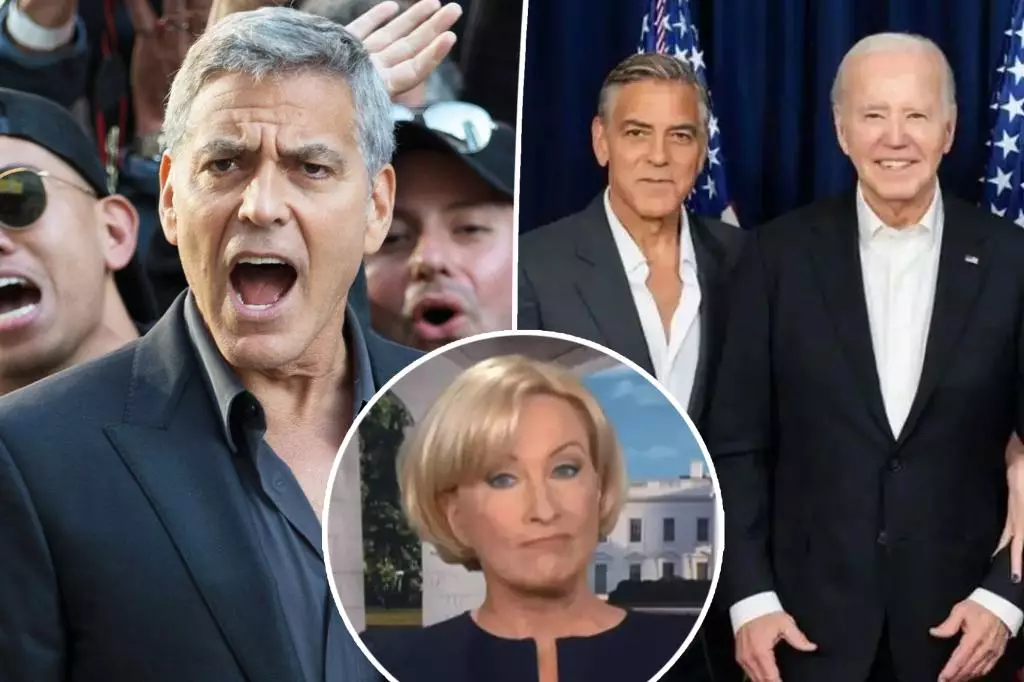In an age where public figures often weigh in on political matters, the lines between celebrity influence and political strategy can blur alarmingly. The recent uproar involving George Clooney, Mika Brzezinski, and Barack Obama exemplifies the precarious position that Hollywood elites occupy in today’s political climate. Clooney, an acclaimed actor with a history of philanthropic and political engagement, found himself allegedly furious over implications that he was influenced by Obama regarding an op-ed encouraging Joe Biden to withdraw from the 2024 presidential race. This incident not only raises questions about the authenticity of public personas but also highlights the complicated relationship between pop culture and political discourse.
The incident first came to public attention in Chris Whipple’s book, “Uncharted: How Trump Beat Biden, Harris and the Odds in the Wildest Campaign in History.” Media outlets have since amplified these revelations, showcasing Clooney’s tumultuous reaction to Brzezinski’s remarks on “Morning Joe.” Such apoplectic responses from a figure of Clooney’s stature shed light on multiple factors that can complicate or even undermine the public dialogue in such high-stakes political scenarios.
The Fallout of Miscommunication
Clooney’s reported tirade against an MSNBC producer reflects a deeper cognitive dissonance between the media’s framing of political narratives and the psychological toll it can inflict upon those within these frameworks. Brzezinski’s on-air suggestion—that Obama had some hand in Clooney’s op-ed—was not just a casual implied endorsement; it was a stark accusation that triggered Clooney’s fury. The insinuation called into question his autonomy and agency as a public figure. Such a moment encapsulates how quickly words can turn friends into adversaries, especially in a cutthroat media landscape where the stakes are outrageously high.
During the alleged phone call, Clooney’s reaction escalated to a series of expletive-laden exchanges with the unnamed producer. His frustration is telling; it suggests an expectation of solidarity among colleagues. Clooney’s demand that his friend should have defended him raises pertinent questions about loyalty in the face of alleged misrepresentation. Conversely, the producer’s dismissal of Clooney’s emotional distress illustrates the disheartening reality that media roles often prioritize efficiency and ratings over interpersonal dynamics. This collision of personal and professional values creates a rift that reverberates through their working relationships, tinging them with mistrust.
Political Commentary and Celebrity Culture Collide
What is particularly striking about this incident is its implications on the nature of public discourse itself. The fragmented conversation around who is influencing who—i.e., whether Clooney is propelling his own political agenda or being manipulated—poses questions about celebrity engagement in political matters. Clooney, by his stature, should be able to voice his opinions without being pigeonholed into tribally-motivated narratives. However, as Brzezinski effectively proposed in her segment, celebrity opinions are often seen through a prism of suspicion, speculating motives rather than resonating with their words.
The fact that this entire debacle erupted on a morning talk show underlines the transformation of casual morning news into a battleground for political implications. Brzezinski’s rhetorical questioning of Clooney’s authenticity inadvertently underscores the erosion of trust not just between celebrities and media but among the audience as well. Viewers are conditioned to doubt the motives behind every public pronouncement, essentially creating a climate of speculation that can often render genuine statements as suspicious.
Clooney’s Authenticity and Identity Under Scrutiny
As the backlash from the incident continues, Clooney’s authenticity hangs in the balance. This blending of celebrity and politics necessitates a closer examination of how public figures are compelled to navigate their identities in the spotlight. Clooney’s reported fury not only signifies a fight against public misrepresentation but also highlights the fragile constructs of personal branding in a 24/7 news cycle.
The effects of this incident provoke a broader discussion about accountability in public dialogue. Whenever a celebrity speaks on a political issue, the response is rarely constrained to the content of their message. It invariably transforms into analysis of their motives, alliances, and qualities of character. Thus, when Clooney expresses discontent, it’s an illustration of a more significant problem within our cultural narrative—misunderstanding has dire consequences, further obscuring authentic voices in a cacophony of misinterpretation. This incident serves as a cautionary tale not just for celebrities but for the public and media who wield the power of narrative and influence.

